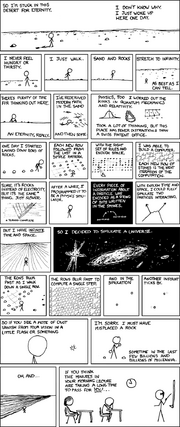- 10,873
- 12,278

So I post the picture to the right mainly, because that is everything the page is based on, so that everyone should be able to give an opinion here.
I want to debate whether the entire "in the rock simulation" key should be removed.
What Cueball does here in a very laborious fashion with stones could be described as "A physicist, that solved physics, decides to sit down on his computer and program a virtual reality universe".
Or in other words what every damn programmer in SAO, or any other virtual reality isekai, could do after some point.
Now one argument I got against this in the past is "anyone who sees our reality as mere fiction would be 10-B" if we went with this.
Certainly not an argument without a point. A being that trancends our reality and for which it is a mere virtual simulation would usually be considered as some high tier character (as long as the virtual world is the normal human world of course, so no matrix).
Or would it? Usually those beings archieve that due to godlike superpowers or tech. In this case however it is a normal, immortal, human that does so.
It is closer to figuring out that you are an NPC in the matrix, than figuring out that there is a great god for which normal humans are as insignificant as fiction.
So I want to know what people think about this. Should it be decided that the key stays, there are revisions that need to be done for it, in my opinion.
Should revision be decided o
First: His intelligence. Currently it reads "He knows the past and present state, position etc. of every particles of the universe, as he is the one to have set them like this."
That however is a huge uncertain assumption, due to the way a turing machine works. As he even puts it in the comic "each new row followed from the last in a simple pattern".
Cueball does the work that a Turing machine does on a band here and as such he only requires very few understanding on what each step actually does or the universe at large. He only needs to now the last row (which he can see) and the pattern from which the next row follows, which is what he derived by solving physics.
It is essentially the difference between knowing how to build a computer and being able to tell and having remembered what each binary string in a program does, while it runs. He can do the former, but not necessarily the latter.
So his intelligence should be supergenius for solving math and physics, instead of nigh-omnisicent.
Next I don't think he qualifies for plot manipulation. He doesn't manipulate a narrative like a fiction, but does a simulation. That is a difference, in my opinion.
Then his tier should be 3-A. He can quite simply stop his simulation and he basically rewrites the universe the entire time in what is an instant for the universe.
I would also consider changin his infinite speed, to human speed. I had a similar case with The Old Man of Wandering Mountai , but decided against ranking him as infinite due to the fact that he only really is infinite if the opponent is caught in his power. If the opponent resists the influence it would not need to go with the pace of cueball simulating the universe. The same would be the case here, I think. If someone can resist being simulated than infinite speed also isn't really the case anymore.
His range should be changed to universe level, if he is made 3-A.
His durability reasoning should be adjusted. He didn't really tank the big bang or anything. I think it would probably be universe level given that simulated attacks couldn't hurt him, even if he really is just a normal human outside.
The Notable Attacks/Techniques section should be rewritten a bit, in my opinion. It is true that he has complete control over the universe if he is simulating it, but as I said in regards to the intelligence, if he tries to do changes deviating from the usual pattern that is like trying to interfere with a computer by changing binary.
So he is absolute cause of all changes, but can likely only coordinate them, beyond the usual simulation, to a limited extent.
Likewise I would agree that he has control over objects smaller than atoms, but the numbers of rocks should be removed as reasoning. The amount of rocks has more to do with how much information is necessary than how large something is.